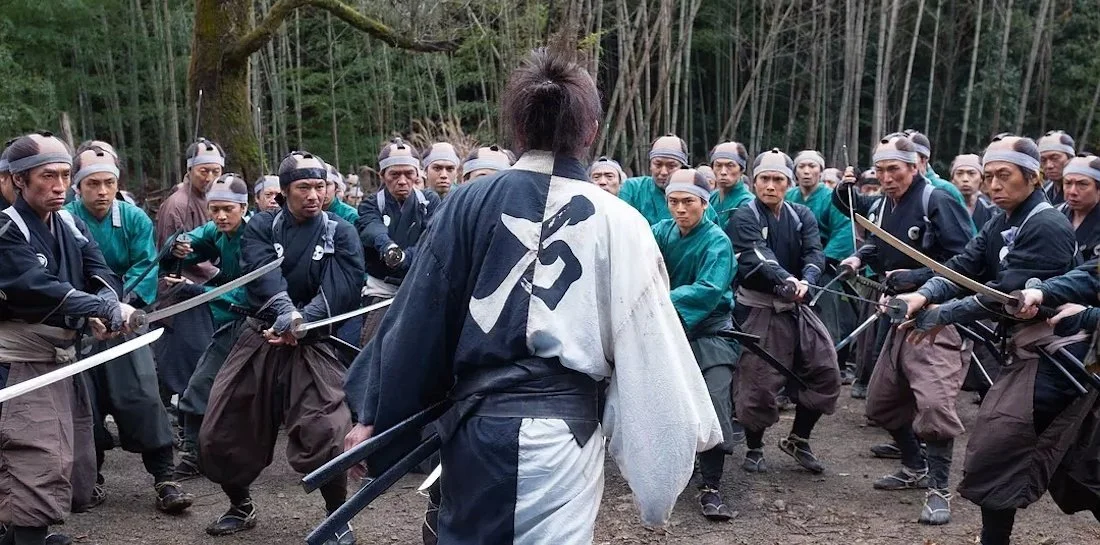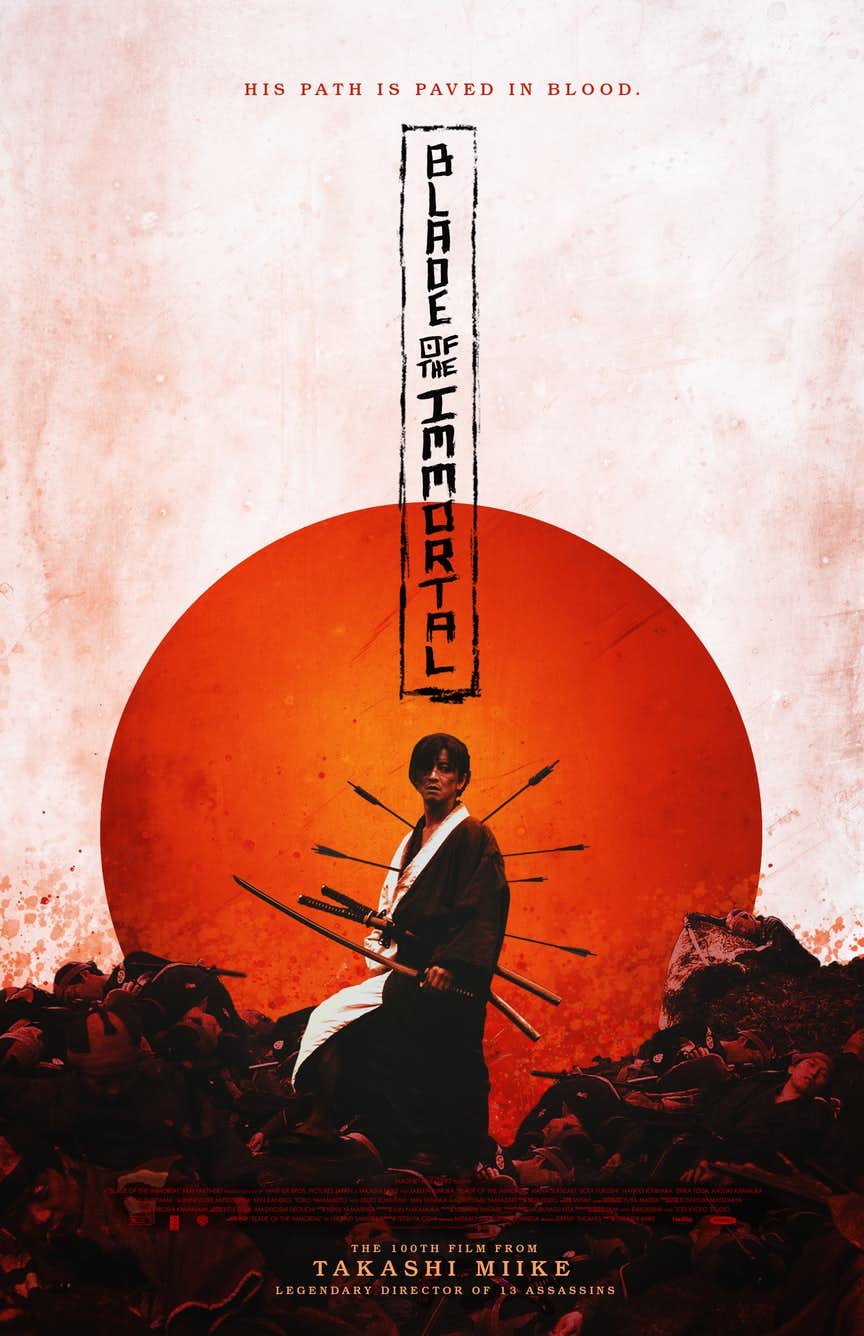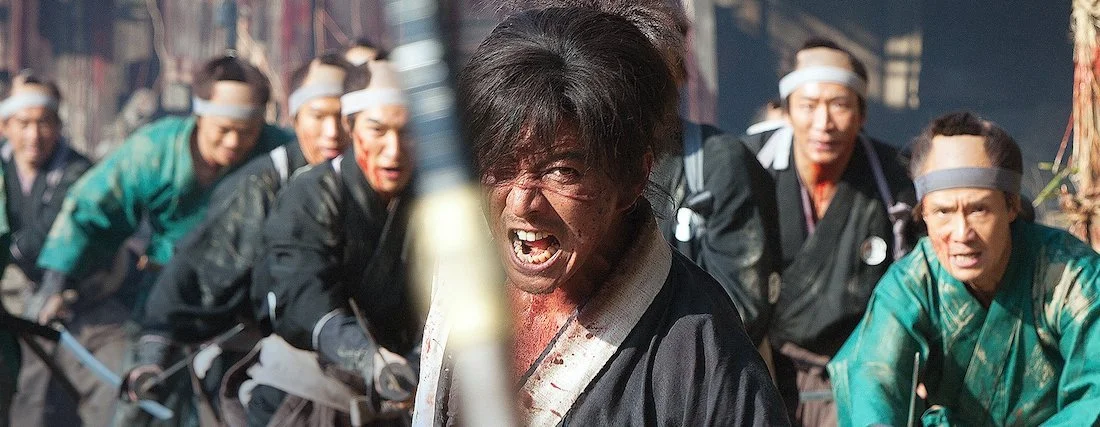BLADE OF THE IMMORTAL (2017)
Takashi Miike is no stranger to making strange, absurd, gratuitously violent movies. The guy made 1999’s AUDITION and 2001’s ICHI THE KILLER after all, and that’s not even scratching the surface of the trip that is his filmography.
With his 100th film, BLADE OF THE IMMORTAL (based off the manga of the same name by Hiroaki Samura), Miike brings his trademarked brand of bizarro with an added twist. Beneath all the blood-soaked craziness lies a surprisingly heartfelt story about loss, trauma, and the healing power of bonds.
We begin the movie with a black-and-white flashback where we’re introduced to Manji (Takuya Kimura) and his sister, Machi (Hana Sugisaki). The two are on the run after Manji had a bounty placed on him for murder. When Machi is killed by bounty hunters, it sparks a vicious sword fight where Manji single-handedly takes down an entire army. After being mutilated and close to death, a mysterious woman curses Manji with immortality as punishment for his sins. She does this by implanting blood worms into his body that will heal any wound and keep him the same age.
The movie then cuts to 52 years later where a young girl named Rin (also played by Hana Sugisaki) witnesses her parent’s murder by the leader of a rival dojo. Swearing revenge, she then meets the same mysterious woman who cursed Manji and is told to seek him out. Being reminded of his sister, Manji reluctantly agrees to help her track down and kill the men who killed her parents.
Like with most live-action manga adaptations, there are more side plots and characters than you can shake a stick at. The odds are stacked against these kinds of movies, as they usually require multiple story arcs to be condensed into one single feature. On top of that, the possibilities of animation are boundless, making any attempt to transition to live-action seemingly futile.
The difference is that BLADE OF THE IMMORTAL is made by Takashi Miike, a man at the top of his game; meaning things that otherwise would be challenge for just about anyone else aren’t for him. The transition is effortless, with the movie feeling like it was ripped right from the pages of the manga, never once coming across cheap or lazy.
This especially goes for the action. Anime fights are notorious for being over-the-top and bombastic, just take a look at popular series like Demon Slayer or Chainsaw Man. Miike doesn’t just bring anime fights to life in all their glory, but also takes fight scenes—usually involving several dozens of people—and gives them focus. The fights are kinetic, with each move flowing to the next with swift, fluid precision.
Speaking of the fights, while they’re all great, the final battle is the highlight. It’s the moment where everything finally comes to a head, with well over 100 characters on screen and multiple battles going on at once. You’d think it’d be easy to lose grasp on what’s happening, but the movie clearly wants you to see everything without missing a beat. The action can occasionally be overwhelming, but that’s just part of the fun.
What really makes BLADE OF THE IMMORTAL special is the relationship between Manji and Rin. They both watched the people they loved the most killed in front of their eyes, leaving them each to react with their own forms of self-destruction. Manji is more than content with isolating himself and fading away from the world, whereas Rin wants vengeance no matter the cost to herself.
There’s a beautiful moment early on where Rin is crying and Manji tells her that if she needs a shoulder to cry on, she can borrow his. It’s a human moment of tender kindness that perfectly sets the foundation for how their relationship evolves over the course of the movie. He cares for her not only because she reminds him of his sister, but because they’re connected by a shared grief.
I’d be remiss if I didn’t take a moment to praise Takuya Kimura as Manji. He carries himself with equal parts badass swagger and soft warmth, injecting an already complex character with even more weight. He’s a walking contradiction, a man capable of great love and immense violence, with Kimura seamlessly interweaving the two into his performance.
Manji and Rin’s growth, together and as individuals, feels natural. By the time everything is said and done, Manji and Rin have become brother and sister, each filling the void left by the loss of the other. We cannot get through life alone. It isn’t designed as a single-player experience. We may come into the world alone, but once we’re here, we need each other to learn, to grow, and ultimately to heal, with their relationship doing just that for both of them.
BLADE OF THE IMMORTAL mixes a wholesome story of found family with a balls-to-the-wall slaughter spree of epic proportions. In finding a perfect balance between the two, Takashi Miike makes his 100th movie one of his absolute best and very much worth your time.





